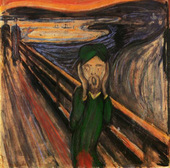|
ThatBasqueGuy posted:Unfortunately there's no way to filter the charts by culture or by a state/colonial mix, so we can't tell for sure how many artisans there are that can actually vote. I'd guess that the Where are the Ulemma when we need them
|
|
|
|

|
| # ? Jun 4, 2024 10:12 |
|
ThatBasqueGuy posted:Clergymen at 1.7% You need for your population to be around 2% clergymen to get the maximum number of research points.
|
|
|
|
Clergymen is a catchall for the intellectual class, since at the start of Vicky 2 most education was still the purview of the clergy. But it also includes professors, educators, and scientists in addition to the religious authorities. Stack all of those together and 2% of the population isn't unreasonable.
|
|
|
|
I don't know why they didn't just call them "Intellectuals" or something
|
|
|
|
Pakled posted:Where are the Ulemma when we need them Most of them sided with the Mahdiyyah and were dealt with accordingly.
|
|
|
|
As that chart clearly shows, we have as many capitalists as we have slaves, which is to say none. Congratulations for the socialists appear to be in order!
|
|
|
|
ThatBasqueGuy posted:Clergymen at 1.7% We should have removed the followers of the Madhi root and stem when we had the chance.
|
|
|
|
The bright side about this whole thing is that people’s arbitrary support for the socialist party, will make arbitrarily supporting the fascist party much easier to stomach.
|
|
|
Redeye Flight posted:Clergymen is a catchall for the intellectual class, since at the start of Vicky 2 most education was still the purview of the clergy. But it also includes professors, educators, and scientists in addition to the religious authorities. Stack all of those together and 2% of the population isn't unreasonable. I think the point is that's weirdly low for Vicky 2, since you need at least 2% clergy for full research. And you often want to go for 4% (that's when the clergy gets hit with a huge penalty to promotion) to get literacy up as fast as you can. But it's not like anyone thought Hashim was trying to play optimally.
|
|
|
|
|
Pakled posted:Where are the Ulemma when we need them Stuck in last place in the vote, a where they always are. Why do you ask?
|
|
|
|
God, I'm looking at the ideological tendencies by POP now and this just seems completely hosed. Small-farmers have +5% to Reactionary thought - i.e., that which in many places holds that they should be serfs - and no bonus to becoming socialist, communist, or fascist. Laborers have +10% towards Liberalism, but like every other party equally. Slaves, bizarrely, can support Liberalism (at +400%, which certainly tracks!) or Conservativism, but literally no other movement? I'm not sure if slave revolts are a major aspect of this game, so I'm not entirely clear why that's even modeled. Craftsmen are even weirder somehow. They have +10% to both Liberalism and Socialism, which, sure. They also have -20% support for Conservativism... but are completely fine with Reactionism, for some reason? Meanwhile, basically the entire middle class has +10% to Liberalism and seemingly no other modifiers on that front, which isn't completely bonkers but still feels a bit weird. You'd think that Clergy/intellectuals, for instance, would end up polarizing towards socialism or fascism in a lot of cases. And it really suggests that none of them have class interests of any kind beyond "uh, I'd like to vote without getting the tar kicked out of me for supporting the opposition party, I guess." I'm sure a large part of it is that party support gets twisted around by events over the course of the game, but even so, it feels like the baseline should look a lot different than it does.
|
|
|
|
In transformative revolutions (e.g. Russia, France, not the US) peasants have been the backbone of the counter-revolutionary reaction, so that makes sense to me. Conservatism for craftsmen basically means they aren't able to make money through capitalistic business practices or have guarantees of a certain standard of living through socialism, so that works too imo.
|
|
|
|
sheep-dodger posted:Stuck in last place in the vote, a where they always are. Why do you ask? Fun fact! Religion and religious policies in vic 2 do literally nothing. Seriously, I don't even think there's any events or anything that use them as a trigger or.. well. Yes. That's it. Policies likewise cause nothing at all to happen.
|
|
|
|
Important to note though that how people feel about religious policy still affects which party they vote for (one with a policy they like).
|
|
|
|
NewMars posted:Fun fact! Religion and religious policies in vic 2 do literally nothing. Counterpoint: religions split up pops, making the game slower :P
|
|
|
|
NewMars posted:Fun fact! Religion and religious policies in vic 2 do literally nothing. It's very important that we accurately model Manichean China.
|
|
|
|
Morrow posted:It's very important that we accurately model Manichean China. No why?
|
|
|
|
Morrow posted:It's very important that we accurately model Manichean China. considering the religious roots of a major civil war that china went through not simulating state religions and it's effects on society and politics yeah unironically this
|
|
|
|
Pop political tendencies don't make sense for what would be in that pop's best interest in V2, but they don't in real life either, so that's kinda accurate there. Especially the poor just not "getting" the grand scheme for their betterment that some intellectual laid out, and everything goes awry.
|
|
|
|
SlothfulCobra posted:Pop political tendencies don't make sense for what would be in that pop's best interest in V2, but they don't in real life either, so that's kinda accurate there. Especially the poor just not "getting" the grand scheme for their betterment that some intellectual laid out, and everything goes awry. Oh, for sure. I just find it weirdly inconsistent on some fronts and too consistent on others. 
|
|
|
|
MaxieSatan posted:Slaves, bizarrely, can support Liberalism (at +400%, which certainly tracks!) or Conservativism, but literally no other movement? I'm not sure if slave revolts are a major aspect of this game, so I'm not entirely clear why that's even modeled. This one makes sense, since Abolishing Slavery is a political (ie Liberal) reform. I don't know for sure, but they might participate in the standard liberal rebellions? Or maybe it's the remains of a scrapped mechanic.
|
|
|
|
The religious policy of the ruling party affects immigration, like, if the ruling party is moralist, religious minority pops are slightly more likely to emigrate.
|
|
|
|
Frionnel posted:This one makes sense, since Abolishing Slavery is a political (ie Liberal) reform. Fair. I suppose them not supporting a Socialist or Communist party that doesn't bother with abolitionism is... internally consistent, at least?
|
|
|
|
Socialists not supporting political reforms is pretty dumb, too, but I guess they wanted to balance it so that they weren't just Liberals But Objectively Better In Every Way? Communists opposing/rolling back political reforms I can kinda understand because they're basically supposed to be authoritarians/Stalinists pursuing a one party state in the framework of V2, but Socialists caucusing with Conservatives to make sure the poors aren't allowed to vote or even that slavery stays legal is just hilarious.
|
|
|
|
A Liberal in the Shura begs a his fellow Majilis, a Socialist, to support his bill to expand voting rights. The Socialist sighs as he caucuses with the Conservatives. "The Working Class rejects your Bourgeois Electoralism."
|
|
|
|
On that note, I hope there's enough liberal pressure to push some more reforms through this term. Much as I'd hate to lose our colonies, we could REALLY use some Socialist rule next decade. Unfuck our industry a bit, modernize our railways.
|
|
|
|
NewMars posted:Fun fact! Religion and religious policies in vic 2 do literally nothing. A victoria 3 really needs to do something with religion.
|
|
|
|
Chapter 13 - A Continent at War - 1886 to 1890 The year is 1886, and a continent is at war. The Tirruni Wars lived in memory as the bloodiest and deadliest of man’s wars, having raged for two decades and cost millions of lives, before finally ending with the fall of Narbuna and the suicide of Sahim Tirruni. As every schoolboy knows, the victorious powers then met in the Congress of Cádiz, an international conference in which they punished the revolutionary nations, quashed liberalism, reinforced monarchy and partitioned Tirruni’s empire. Contemporaries and historians alike have criticised the congress extensively, but it did establish a tenuous balance of power in the continent, helping prevent another conflict as widespread and destructive as the Tirruni Wars. Until now, that is.  Early in April of 1886, Andalusi and Moroccan diplomats met at Granada to finally address the question of Qartayannat. The coastal city was claimed as a core province of Al Andalus, but the Berbers had invested heavily into the expansion and fortification of the city, and weren’t willing to part with it. The negotiations quickly escalated from there, with the Berbers storming out on the sixth day, threats of war and promises of retribution ringing down on them. This dispute would have far-reaching ramifications for the entire continent. Almoravid Morocco sent emissaries to the Dual Monarchy whilst Al Andalus reached out to the South German Union, with both empires quickly securing the backing of their stalwart allies. South Germany had enemies of their own, however, and the Russian Empire agreed to a temporary pact with Morocco and France, forging the Congressional Coalition. The Celtic Union, meanwhile, dispatched emissaries to negotiate an alliance with Qadis and München, transforming their dual alliance into the Triple Alliance. And with that, two distinct blocs emerged.  On the summer solstice of 1886, 60,000 soldiers poured across the border and into the Moroccan exclave, besieging Qartayannat and Marriya.  In Qadis, Grand Vizier Murad acted quickly, passing an order for the general mobilisation of the populace. And over the next few days, hundreds of thousands of green, unexperienced soldiers were given a uniform, handed a gun and thrust into trains, which carried them to the frontlines in a matter of weeks.  At the same time, however, tensions had already exploded into battle on the open sea. The Iron Fleet thus swept into the straits without delay, only to find the Almoravid Navy waiting for them. A minor battle quickly ensued, with the Berbers retreating within hours, surrendering the straits to the Iron Fleet.   The victory was met with an immediate outpouring of celebration in Qadis, but the Andalusi high command was less enthusiastic, because it quickly became apparent that the naval battle was nothing more than a distraction. Whilst ironclads were trading torpedoes in the First Battle of the Straits, Berber transport vessels stole across the channel further downcoast, landing 25,000 soldiers off the coast of Qadis.  The Grand Vizier immediately retaliated, dispatching messengers to Faqadat al-Mukhayyam, who'd just captured Qartayyanat. Having received his orders, Faqadat immediately embarked on a march towards Qadis.  The two armies clashed a fortnight later, with thick fighting erupting beneath the walls of Qadis. Desperate to reinforce the battle, the Almoravid Navy rushed back into the straits, colliding with the iron wall defending the narrow passageway. Thus began the first important engagements of the war, with the Andalusi and Berbers meeting on land and sea, determined to emerge victorious on both fronts.  From the very outset of the fighting, however, the Andalusi had the upper hand. The Moroccan expeditionary force were severely lacking in artillery, allowing the Andalusi to rout their flanks within hours, crushing the shattered army in a decisive victory.  At the same time, the Second Battle of the Straits was raging at sea, dominated by heated duels between enemy ironclads. The Grand Admiral focused his firepower on the enemy’s man-o’-wars and frigates, setting dozens of warships aflame within hours, and though the Iron Fleet suffered its fair share of casualties it emerged victorious all the same, cementing Andalusi control of the straits in the war to come.  Concurrently, another 60,000 soldiers arrived on the northern front. The warplan here depended on seizing the initiative and knocking the French out before they could properly mobilise, so Zafir quickly pushed into enemy territory on an aggressive offensive towards Tulle.  The first enemy army didn’t materialise until the Andalusi reached Tulle, with 30,000 Frenchmen attempting to retake the town on seven hills, but the Andalusi managed to rout the larger French army after just days of heavy fighting.   The French lost 20,000 soldiers, but this wasn’t their first defeat, with the Dual Monarchy having already been pushed back by both the Celtic Union and South Germany. In Britain, the Celts had launched a devastatingly successful campaign into England, emerging victorious in a string of battles that stretched from Birmingham to London. This campaign climaxed in the battle of Canterbury, where 100,000 Celts engaged and prevailed over 65,000 Frenchmen and Englishmen.  In the east, meanwhile, the South German Union was fighting the war on two fronts. They had already seized the upper hand on the western front, throwing three enemy armies back into the French heartland, but they were facing fierce resistance from the Russians on the eastern front. The success of the German warplan depended heavily on one thing: the Vienna Corridor. This was the narrow border shared between the two enemies, and if it fell, then all of South Germany would lay open to the Russians.  Despite being dubbed the "Continental War" by many (with others referring to it as the "Little War" or "Dispute of Granada"), the fighting wasn’t restricted to Europe. Vicious clashes also erupted in Africa, where the expeditionary forces and colonial armies of the great powers were ordered to invade enemy territory, with the bloodiest battles being fought in the east African colonies of Morocco and Al Andalus.  A Moroccan army invaded Andalusi Africa in February of 1887, threatening the routes into Andalusi Kongo, so the self-proclaimed Khedive of the Kongo dispatched his autonomous army against the Berbers, led by his son and heir: Wahb Min-al-Bita. The young commander arrived on the front two months later, where a desperate and ultimately-futile struggle ensued.   The colonial army was utterly destroyed, and Wahb himself was captured by the Berbers, with the commander quickly transported to Morocco, where he met with the Almoravid Sultan.  It wasn’t long before the Grand Vizier and Majlis turned to fronts closer to home, however. More worrying news arrived in May of 1887, with the Russians circumventing the Vienna Corridor by invading neutral Bohemia, before rushing southward and colliding into the German rear. A string of devastating defeats quickly followed, with large parts of the South German army surrounded, captured and killed. The casualty count broke 100,000 by July, as vast tracts of Slovenia and Austria fell to the Russians, including Vienna itself.  More troops were thus diverted away from their western front, allowing the French to devote greater numbers against the Andalusi, who were forced back to Tulle after briefly occupying Poiters. Outside the town, another battle erupted between the opposing forces, but another 60,000 reinforcements poured onto the battlefield and allowed the Andalusi to seize another victory.   Further south, meanwhile, Faqadat al-Mukhayyam had spent the past few months gathering a massive invasion force at Qadis and Jabal Tariq. By autumn of 1887, this force numbered 125,000 soldiers - largely green conscripts, but with a strong core of disciplined veterans. And hoping to catch the Moroccans off-guard, Faqadat launched his invasion just as the campaigning season came to an end, crossing the straits and storming Tangiers and Ceuta in a devastating offensive.  With the war going well, Grand Vizier Murad could finally turn his attentions back to East Africa, where the Berbers were rampaging with impunity. Upon the insistence of the Imperialists, Murad dispatched a telegram to Bengal, commanding their Governor of Bengal to transport his forces to Mozambique.    After three months at sea, the Indian Expeditionary Force finally landed at Kilwa Kisiwani, immediately pushing northward on a cautious march. Leading tired soldiers into foreign territory wasn't the cleverest strategy, however, and they were easily drawn into a trap by Berber scouts. As they were passing through the Great Rift Valley, thousands of Berber soldiers fell on the Andalusi, catching them unawares and slaughtering thousands in an utter massacre.   These losses dimmed the mood in Qadis, but Grand Vizier Murad quickly bounced back, this time waging war on the diplomatic front. The Grand Vizier had sent emissaries across the Atlantic some weeks before, hoping to entice his allies in the new world into joining the war. The Berber Union was adamantly neutral, but after obtaining the promise of territorial concessions in North Gharbia, the Revolutionary Republic of Ibriz agreed to join the conflict and declared war on the Dual Monarchy.  This development infuriated the Congressional Coalition, and Russia soon retaliated, drawing the Kingdom of Serbia into the war with the promise of Istria and Slovenia.  Worrying, perhaps, but it wasn’t long before the Andalusi scored another victory. This time, they managed to convince the Oba of Benin - and "King of West Africa" - to throw his lot in, with Benin formally declaring war on Morocco late in June.  The war was quickly escalating, but all in all, these developments were favourable to Al Andalus, because it meant that Morocco had to reroute their newly-raised troops southward. So the Andalusi chose this moment to launch another offensive, and with 90,000 soldiers flooding southward, the Berbers quickly leapt to action.   Battle had been raging for weeks without end, but when the reinforcements swarmed onto the blood-drenched fields, the tide of the battle slowly began to turn. After another week of thick fighting, the Moroccan army finally retreated, having bloodied the Andalusi at the expense of heavy losses.  To the north, the field marshal had just completed his siege of Angoulême, bombing the populace into surrendering. With that, the entirety of southern France was brought under Andalusi occupation, and the army was advancing on Poiters just two weeks later. Capturing Poiters would crack open the gates into northern France, paving the very road to Paris... unfortunately, however, the capital of the Dual Monarchy would never fall to the Andalusi.  To the north, the Celtic Navy had crushed the French fleet in the battle of Dogger Bank, allowing them to transport almost 300,000 troops across the Channel, pushing south and besieging Paris before the month was out.  These stunning triumphs were balanced by devastating losses to the east, however. Having seized the initiative, the Russians surged westward on a massive offensive, chasing the remnants of the South German army into Bozen. There, they were utterly crushed in one of the war’s bloodiest battles, with almost 70,000 Germans being lost to death or chains in a devastating last stand - one that would have ramifications long after the war was decided and done.  The Archduke of Bavaria, meanwhile, had refused to abandon his country in its hour of need. He managed to escape the battle of Bozen, fleeing west and holing up in Konstanz with a token force. There, he managed to resist the besiegers for almost a year, but he couldn’t withstand Russian artillery forever. In March of 1888, the city’s defenders finally capitulated, with the Russians heavily sacking the city. The Archduke himself went missing during the chaos, and his body was never recovered.  Word of this disaster quickly reached the European capitals, and though Grand Vizier Murad delivered his condolences and offered his sympathies, he refused to end the war just yet. On the southern front, field marshal Faqadat had met with increasing success, quickly capturing the cities and towns surrounding Fes. And once garrisons were installed, he finally marched on Fes itself, determined to seize the economic capital of the Almoravid Empire.  Fes was well-fortified, with the city surrounded by stone redoubts and newly-dug trenches, but it controlled the strategic routes towards Marrakesh, and thus it had to be taken. Another 20,000 soldiers would be lost in the assaults on Fes, but the vital city would finally be captured in the dying days of August.  Faqadat wasted no time in celebration, immediately pushing southward on a forced march, determined to capture Marrakesh - and all the fame and glory that came with it. Marrakesh was not Fes, however, and the Almoravids had invested significant resources into its reconstruction and fortifications since the infamous Sack of Marrakesh. Bastions were erected around the city, a moat was dug between the walls, towers were constructed at regular intervals, cannonry was installed along ramparts, and a new city guard was recruited to man them - there was no doubts at all, Marrakesh would be a tough nut to crack.  Back to the north, meanwhile, the Celts had brought large parts of northern France under occupation. Queen Julianna had already fled to Smolensk, allowing the Russians to freely advance on Celtic lines, with the first bullets being exchanged in Amiens, Charleroi, Troyes and Dijon - largely indecisive battles.  At the same time, a combined Russian-French fleet managed to break the Celtic Navy in the Channel. Once a general blockade was established, a large Russian army was landed at Lincoln, where a token Celtic force was crushed.  In East Africa, meanwhile, the battles raging between Al Andalus and Morocco were not yet over. With substantial assistance from Khedive Balanabus, another colonial army was recruited from Kongolese and Kilwan peasants, with this army numbering 30,000 by the spring of 1889.  The Berbers engaged the new army beneath the walls of Kilwa Kisiwani, expecting another easy victory to complete their conquest, but the Andalusi seized a stunning victory from the jaws of defeat - surrounding and annihilating the entirety of the Berber force, with only a few hundred escaping the massacre and fleeing northwards.   Back in Europe, meanwhile, the battle for France had ended in abject failure for the Celts. The Russian armies were larger and better-trained, and quickly forced the Celts to fall back, abandoning cities and fortresses in their retreat towards the coastline. Russian warships were patrolling the Channel, however, so there would be no escape. Instead, the Celts were forced to make their last stand at Cambrai, where hundreds of thousands clashed in a heated frenzy of a battle, with opposing commanders brawling tactically and trading blows and doggedly refusing to retreat. The war’s bloodiest battle would rage for almost four days, with 150,000 bodies littering the field by twilight of the third day, and a Russian flag fluttering proudly in the wind.  This hard-won victory was quickly followed by the recapture of Paris, and from there, the Russians could push southward - towards the Andalusi.  Two Russian armies met the vanguards of two Andalusi armies at Poiters and Limoges, but the Andalusi threw them back in two simultaneous victories.  Whilst the fighting had been raging, however, two larger Russian forces circled Andalusi positions and outflanked them. They were obviously attempting to completely surround the Andalusi, so Zafir immediately pushed south in a sudden attack, with the talented general scoring two more victories.   Four decisive victories in less than a month, and the perceived invincibility of Russia was shattered. Suspending any further attacks for two months, the Russians began to mass their forces at Paris. The Andalusi, meanwhile, spent these weeks fortifying their new frontline, which stretched from La Rochelle to Tulle - reinforcing the walls and towers, digging trenches and moats, mining rivers and lakes. The offensive finally began in September of 1889, with 40,000 Russians engaging the Andalusi army stationed at La Rochelle, bounded by trenches and ditches.   This attack proved to be nothing more than a ruse, however, as another Russian army had surged south and engaged Zafir’s weaker flank in the east. The field marshal wasted no time in retaliating, marching his army across the width of the frontline and reinforcing another battle, before throwing back the second Russian army with heavy casualties.   Just two days later, however, two more Russian armies swept south in strength, engaging the entire frontline from La Rochelle to Tulle.  The Twin Battles of La Rochelle and Tulle followed, and in one of the greatest tactical feats of the modern era, the Andalusi emerged victorious in both. The final casualty count reached 55,000 for the Russians, whilst the Andalusi suffered just 15,000 dead and captured. This finally quashed any doubters - Al Andalus boasted the strongest military in Europe, unmatched by the other great powers.   In the north, however, the Celtic Union had collapsed before the Russian advance, losing the entirety of Britain to the enemy. And to make matters worse, another Russian army landed at Belfast in February of 1890, quickly seizing the cities and towns dotting the north before marching on Dublin.  As for the South German Union, well, they’d been suffering under brutal occupation for three years now. Their army was demolished and their archduke was dead, but the Russians refused to treat or make peace with them, not until the Andalusi surrendered.  Celt and German diplomats seemed to arrive at Qadis on an hourly basis, clamouring for expeditionary forces, monetary subsidies, army supplies, an end to the war - their demands had no end, but Grand Vizier Murad was deaf to these moans. Al Andalus would win the war, alone if needs be. The Russians and French were just as determined to emerge victorious, with the Dual Monarchy launched their first proper offensive in the spring of 1890, dispatching their newly-built army to assault Andalusi positions along the Pyrenees.  To the confusion of Andalusi generals, however, the fighting quickly devolved into a stalemate. French arms and tactics had improved immensely, with their artillery massively outclassing Andalusi guns in range and radius, and the fighting quickly turned against the Andalusi.  This defeat was met with uproar in Qadis and revelry in Paris, with the Dual Monarchy immediately dispatching more troops southward, whilst the Andalusi were forced to pull troops back from North Africa. As 40,000 troops were crossing into Iberia, however, the Berbers seized the faint opportunity to drown them all. Fifty Almoravid warships clashed with the Iron Fleet in March of 1890, but this attack would prove very ill-timed, because the first Andalusi battleships had just completed construction and joined the fleet. Strengthened by these steam-and-steel mountains, the Grand Admiral orchestrated the complete demolition of the Almoravid Fleet, with every single ship sunk in the Fourth Battle of the Straits.   With that victory, however, the Iron Fleet was at its weakest, and would likely fold if faced with another Berber or Russian fleet. Fortunately, the end of war was at hand. The siege of Marrakesh had dragged on for over a year now, but artillery finally managed to force a breach in the southern walls of the Isolated City, with thousands of Andalusi swarming into this breach, seizing the surrounding towers and striking out in every direction. By day’s end, Marrakesh had fallen to the Andalusi.  The Almoravid Sultan would not suffer another sacking, however, and immediately surrendered in return for amnesty. He dispatched diplomats to a meeting with the Andalusi at the neutral city of Narbuna, where he finally agreed to relinquish Qartayannat, in addition to a stretch of East Africa, Malta and extensive war reparations.  The Berbers were already reluctant to make these concessions, but as the talks were nearing their end, the Andalusi managed to force one last clause into the treaty. Article 12 - or the Abolition of the Abhorrent Slave Practice in Moroccan territories - was touted by Imperialists in the Majlis, who were determined to end the slave trade once and for all (and if that caused the Moroccan economy to crash, well, that was just an unintended side effect, of course). And with revolts and rebellions erupting across North Africa, the Almoravids were forced to concede and sign the Treaty of Narbuna.  And with that, after almost five years of unrelenting conflict, the Continental War comes to an end. All in all, the final casualty count had reached 3,176,016 - two thirds of which were suffered by the Congressional Coalition, and the remaining third by the Triple Alliance, with a roughly-equivalent number of warships sunk on either side. This was the price for Qartayannat.  The Treaty of Narbuna was announced to the general public in August of 1890, to the chagrin of the Celts and South Germans. They had been present at the negotiations as well, of course, but the Dual Monarchy and Russian Empire refused to make any concessions to them - and with the Andalusi having been pushed back to the Pyrenees, they couldn’t exactly force the matter. So for the millions they lost on the battlefield, the Celts and Germans gained nothing. That didn’t mean they would do nothing about it, however. With the Russians withdrawing from South Germany, Karl-William was crowned the Archduke of Bavaria and President of the South German Union. Karl-William’s first act in power was to pay respects to his father, with a grand funeral hosted in the capital just two weeks later, open to the general public of München.  Once the funeral was over, and the empty coffin was entombed, Archduke Karl could begin tackling the crises. And first on his agenda was, inevitably, Al Andalus. In September of 1890, the Archduke formally expelled Andalusi diplomats and emissaries from München, quickly followed by the severance of their alliance. Desperately hoping to salvage their relations, the Grand Vizier dispatched Amir Khuzaymah to meet with the new archduke, to which Karl famously “offered his sympathies” before promptly dismissing the crown prince of Al Andalus.  This would leave Al Andalus diplomatically isolated, but to many viziers in the Majlis, it was well worth it. At long last, the entirety of Iberia was reunited under their rule, with only the neutral city of Narbuna evading them.  And with that, a new era begins. The Great Powers had spent the years since the Tirruni Wars in pursuit of continental dominance - huge investments were made into industry, military technology advanced at an unprecedented rate, powerful alliance blocs were forged between former rivals - all of which finally came to a head in the Continental War of 1885. Al Andalus emerged from the conflict victorious, but that doesn’t necessarily mean that the enemy has been defeated. The Russian Empire has flexed its strength on the world stage, and almost single-handedly fractured the Triple Alliance of Al Andalus, South Germany and the Celtic Union, marching across the width of Europe to halt the Andalusi advance. Al Andalus and Russia - these two empires have transformed the balance of power in Europe, and are already preparing to duel for dominance of the continent, but many have voiced their concerns about any future conflicts. Russia has begun efforts to modernise their military, the Dual Monarchy are already expanding their reformed army, the South German Union are determinedly pursuing the complete unification of Germany... the Continental War has established an unsustainable balance of power, one that threatens to explode into an entirely new breed of war - a war to end all wars.  For now, however, Al Andalus can rest on its laurels. After a century of shameful humiliation, unjust treaties, fruitless disputes, determined rearmament and continental war, Al Andalus has finally emerged triumphant. The age of Morocco had ended, and the age of Al Andalus is just beginning.  World map: 
hashashash fucked around with this message at 13:34 on Dec 24, 2018 |
|
|
|
|
We are finally whole!:cryingpomegranate:
|
|
|
|
 HNNNNGGGHHH
|
|
|
|
Well, now it is time to go full in on reforms and rebuilding our industry!
|
|
|
|
russia is terrifying, they just destroyed germany and reconquered france and britain. that'll be fun in the future now we can immediately become hardcore socialists and break into a civil war with the massive conservative power base we've groomed over the last few decades. i wonder how we can avoid shattering our united iberia within years of its creation - can we perform a, like, gradual climb-down? ending the almoravid slave empire like that is cool  does the berber union still do slavery? does the berber union still do slavery?by the way the celts are still our allies if i'm reading it right, but do they hate us as much as they should? and do the south germans? edit: did ibriz ever really do anything? oystertoadfish fucked around with this message at 17:52 on Aug 18, 2018 |
|
|
|
that's the silly paradox war leader system we know and love
|
|
|
|
I want those loving mountains turned into a god drat doom wall that nobody can ever cross again
|
|
|
|
Japan looks like the best power to buddy up with now, given that they border Russia and Morocco and seem to have a higher military and industry score than anyone.
|
|
|
|
Is there anyone in Europe who doesn't hate us?
|
|
|
|
The Age of Al-Andalus! 
|
|
|
|
I for one thing we should pursue alliances with Ibriz and Japan, avoid faffing about in unnecessary messes on the continent. We already have Iberia and to be frank, that's all we really wanted.
|
|
|
|
Did we seriously get that random 'no alliance for you!' event fire for a third time, or was it something else? Time for Socialism, so we can get the civil wars out of the way while everyone else is in truce time. Also I second the alliances with Japan and Ibriz.
|
|
|
|

|
| # ? Jun 4, 2024 10:12 |
|
Al Andalus finally retakes its birthright and it's rightful position among the European majors. On the other hand, Russia emerges as a world power.
|
|
|








































